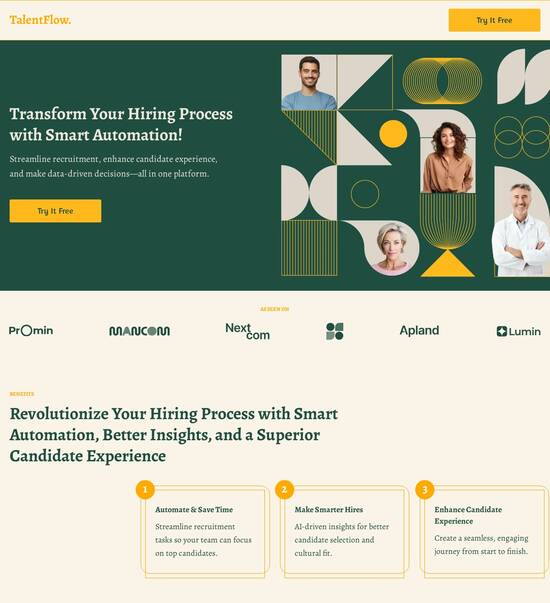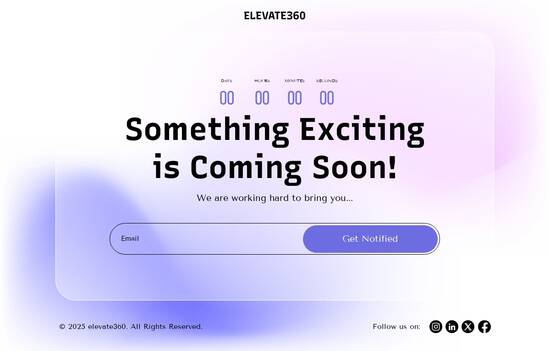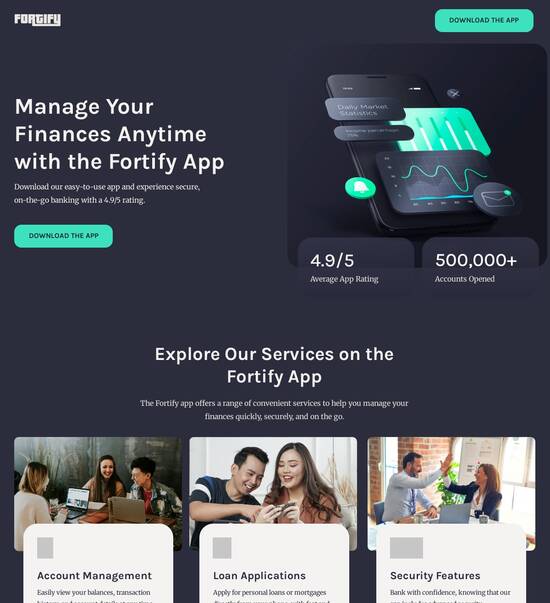
Website Template for Carbon Offset Programs
Explore Similar TemplatesAbout template
Create customized landing pages quickly and efficiently with Instapage's template designed for carbon offset programs.
Recommended templates

Easy to build without coding
With the intuitive drag-and-drop builder, anyone on your team can create high-converting pages without any knowledge of code or design. Make enhancements to your landing page with custom widgets using Javascript, HTML/CSS, or third-party scripts.

Multiple layouts for any industry and goal
Select from 500+ landing page layouts built to boost conversions across industry-specific scenarios. Customize them by adjusting fonts, adding images, and generating on-brand content with the AI assistant. Quickly scale with Instablocks® and Global Blocks that you can save, reuse, and update globally.

Loads fast and looks polished on any device
Every template is responsive, which means they present professionally on any device and load blazingly fast with our Thor Render Engine. You can also power them up with Google AMP technology to deliver an unparalleled mobile experience and drive higher conversions.

Robust analytics & experimentation
Get real-time updates and reporting across all your devices, showing the number of visitors, conversions, cost-per-visitor, and cost-per-lead. Launch AI-powered experiments, run A/B tests, and use heatmaps to analyze user behavior, then optimize your landing page to maximize conversions.







Easy to build without coding
With the intuitive drag-and-drop builder, anyone on your team can create high-converting pages without any knowledge of code or design. Make enhancements to your landing page with custom widgets using Javascript, HTML/CSS, or third-party scripts.
Multiple layouts for any industry and goal
Select from 500+ landing page layouts built to boost conversions across industry-specific scenarios. Customize them by adjusting fonts, adding images, and generating on-brand content with the AI assistant. Quickly scale with Instablocks® and Global Blocks that you can save, reuse, and update globally.
Loads fast and looks polished on any device
Every template is responsive, which means they present professionally on any device and load blazingly fast with our Thor Render Engine.
Robust analytics & experimentation
Get real-time updates and reporting across all your devices, showing the number of visitors, conversions, cost-per-visitor, and cost-per-lead. Launch AI-powered experiments, run A/B tests, and use heatmaps to analyze user behavior, then optimize your landing page to maximize conversions.
All the features you need to build carbon offset website integration
Explore more featuresLearn how to build top-performing landing pages for any goal
FAQs
Leading the way in building high-performing landing pages





An optimal landing page template for carbon offset programs
Landing pages play a crucial role in converting visitors into leads, especially for carbon offset programs aiming to elevate environmental impact. Instapage's landing page template specifically designed for carbon offset initiatives enables efficient capture of leads while maximizing campaign performance. With ready-to-use formats and powerful conversion elements, you can effectively communicate your program's value and drive actionable results.
Understanding carbon offset programs and their online presence
A successful carbon offset program needs not only to advocate for environmental consciousness but also to convert those values into actions. Today’s consumers are looking for effortless ways to contribute to sustainability. Your landing page should speak directly to that motivation, showcasing how your program directly impacts their carbon footprint and providing easy avenues to engage. This section will explore how to structure this narrative effectively.
- Highlight clear benefits of carbon offsetting: Clearly communicate the tangible impacts of joining your initiative, including statistics on carbon savings and community benefits.
- Utilize visuals and testimonials: Incorporate engaging imagery and testimonials from satisfied participants to build trust and illustrate real-world impact.
- Integrate simple CTA buttons: Ensure that your ‘Join Now’ or ‘Learn More’ buttons are prominent and lead directly to the participation process.
Steps to create your carbon offset landing page
The process involves several steps to ensure your landing page is not only attractive but also drives conversions effectively. Follow these instructions to achieve optimal results.
Define your target audience and their motivations
Understanding your target segment is key in optimizing your page. Consider the following aspects:
- Identify specific demographics: Tailor your content to speak to groups specifically interested in sustainability—a diverse audience from eco-conscious businesses to individual consumers.
- Understand pain points: Address common concerns regarding the effectiveness or integrity of carbon offsetting, and clarify how your program overcomes these challenges.
- Personalize engagement: Use tools for dynamic text replacement on landing pages to personalize the user experience based on their web behavior.
Optimize your landing page for conversions
Once your template is set, ongoing optimization is vital. Incorporate A/B testing and heatmaps to gather insights on how users interact with your page:
- Conduct regular A/B tests: Experiment with different headlines, CTA placements, and imagery to find the most effective combinations.
- Analyze visitor behavior: Utilize heatmaps to identify areas where visitors are engaging most and refine the layout accordingly.
- Monitor analytics: Keep track of conversion rates and engagement metrics to inform future adjustments.
Creating an impactful landing page isn't just about aesthetics but involves strategic planning and execution. By following the steps outlined above, your carbon offset program can attract and convert a dedicated audience ready to make a difference.
Ready to maximize your carbon offset impact? Start with Instapage's powerful template today and turn your landing page into a high-converting asset for your environmental mission!
People also ask about Website template for carbon offset programs
Website templates for carbon offset programs: Empowering sustainable communication
Understanding carbon offset programs: The need for effective communication
As the global community grapples with the pressing issues of climate change, carbon offset programs have emerged as valuable solutions to mitigate greenhouse gas emissions. Carbon offsetting refers to the practice of compensating for emissions produced by investing in projects that reduce or remove carbon from the atmosphere. Such initiatives are critical not just for compliance with regulatory requirements but also for organizations aiming to demonstrate their commitment to sustainability. By understanding the fundamentals of carbon offset programs, stakeholders can better appreciate their importance and the necessity for clear communication.
Carbon markets function as platforms allowing for the trading of carbon credits. These credits are generated through verified projects such as reforestation, renewable energy development, and energy efficiency improvements. In essence, the carbon offset market creates economic incentives to reduce emissions, ultimately contributing to global targets for emission reduction. However, the effectiveness of these programs against climate change hinges largely on public awareness and engagement.
Increased engagement and awareness drive participation in carbon offsetting.
Transparency builds trust in the integrity of carbon offset projects.
Clear communication enhances the credibility of carbon offset programs.
Nonetheless, carbon offset programs face significant challenges. Many potential participants are often unaware of how these programs function and the benefits they provide. Furthermore, issues surrounding transparency, data integrity, and the accurate reporting of emission reductions can undermine public confidence. This is where the design of effective website templates becomes crucial—they serve as the primary platform for communication, education, and engagement with the public.
Key features of website templates for carbon offset programs
An effective website for carbon offset programs must feature several elements that promote user engagement and information clarity. Chief among these features is a user-friendly interface. Visitors should encounter intuitive navigation that allows them to easily find information relevant to their interests. Accessibility features are also imperative, ensuring that all users, regardless of their abilities, can comfortably interact with the site.
Beyond navigation, a comprehensive program information section is vital. This section should provide an overview of various offset programs and detailed explanations of the actions taken by each initiative. Prospective participants need to understand how their contributions translate into tangible environmental impacts.
User-friendly interface with intuitive navigation.
Comprehensive program information sections.
Interactive tools like carbon calculators enhance engagement.
Dynamic updates keep users informed about emission reductions.
An interactive carbon calculator is another essential feature. By enabling users to calculate their carbon footprint, these tools provide personalized recommendations that enhance their engagement with offset options. Furthermore, a dynamic updates section will help visitors stay informed about the program's achievements and any new initiatives, fostering ongoing interest in participation.
Transparency is key in today’s climate, which makes privacy policies and compliance sections indispensable. Detailed explanations of how user data is handled, as well as compliance with regulations such as GDPR and CCPA, will reassure users about their information's safety.
Customization options for enhancing user engagement
Personalized user experiences play a significant role in engaging participants in carbon offset programs. A robust website template allows for custom user preferences, allowing users to tailor their interactions based on behavior or interests. This customization can lead to more relevant information delivery, which, in turn, fosters user loyalty.
Visual storytelling and multimedia integration can further enhance user engagement. Infographics, animations, and videos can simplify complex topics, making the benefits and mechanics of carbon offsetting more digestible. Incorporating participants' testimonials and success stories through these media can also create an emotional connection, enriching the overall user experience.
Personalized user experiences through custom preferences.
Visual storytelling with infographics and multimedia.
Integration with social media to foster community building.
Social media integration is pivotal for building a community around carbon offset programs. The inclusion of share buttons encourages users to disseminate information across their own networks. Additionally, forums or discussion boards invite user interaction, creating spaces for sharing experiences and ideas about carbon offsetting.
The importance of integrity and transparency in carbon offsetting
Integrity and transparency are cornerstones of successful carbon offset programs. Showcasing program integrity through visible certifications and affiliations with recognized environmental organizations strengthens trust among potential participants. Additionally, displaying third-party audits and evaluations can further bolster credibility, assuring participants that their investments are resulting in verifiable impacts.
Equally important is building trust with clear terms and conditions. Transparency about the operational processes of the carbon offset programs, user participation guidelines, and details around reporting emissions and reductions help clarify expectations. Such clarity is essential to fostering a robust relationship between the program operators and participants, ensuring collective accountability.
Showcase certifications from recognized organizations.
Provide transparent terms and conditions for user participation.
Display third-party evaluations for additional credibility.
Responsive design and mobile optimization
A responsive design ensures that carbon offset program websites deliver optimal experiences across all devices. With a growing number of users accessing websites via mobile phones, a mobile-first design is paramount for engagement. Testing website performance on various screen sizes can identify issues and enhance user interactions.
Moreover, website loading speed can significantly impact user retention. Fast loading times are critical for keeping visitors engaged, especially in an age where convenience is paramount. Techniques such as optimizing images, using content delivery networks, and minimizing scripts can enhance performance without compromising content quality.
Responsive design for seamless access across devices.
Importance of mobile-first design for user engagement.
Performance optimization techniques to enhance loading speed.
Leveraging analytics for continuous improvement
Analytics serve as a powerful tool for carbon offset programs to gauge user engagement and optimize website performance. Tracking user behavior can provide insights into key metrics, such as the most visited pages and the duration of users' sessions. This information can be pivotal in refining content strategies and enhancing user experiences.
Moreover, implementing feedback mechanisms such as surveys and feedback forms allows programs to gather direct insights from users. By actively seeking user input and implementing changes based on suggestions, organizations can foster a culture of responsiveness that increases participant engagement and satisfaction.
Track key user behavior metrics for optimization.
Implement feedback mechanisms for user input.
Utilize data insights for personalization strategies.
Future trends on the horizon for carbon offset programs
As the landscape of carbon offset programs evolves, emerging technologies are playing an increasingly vital role. Blockchain technology is garnering attention for its potential to enhance transparency and verification processes within carbon markets. By providing an immutable record of transactions, blockchain can bolster trust in carbon offset trading.
In addition, the potential integration of artificial intelligence in program management is likely to bring new efficiencies. Predictive analytics could help organizations tailor their offerings and optimize outreach strategies to maximize impact. Furthermore, as public awareness campaigns grow, the evolving perception of carbon offsetting will likely influence regulatory frameworks, shaping future participation in these programs.
Emerging blockchain technology for enhanced transparency.
Potential AI integration for efficiency in management.
Evolving public perception shaping regulatory frameworks.
Ready to skyrocket conversions?
Supercharge your ad campaigns with high-performing landing pages
Get started














